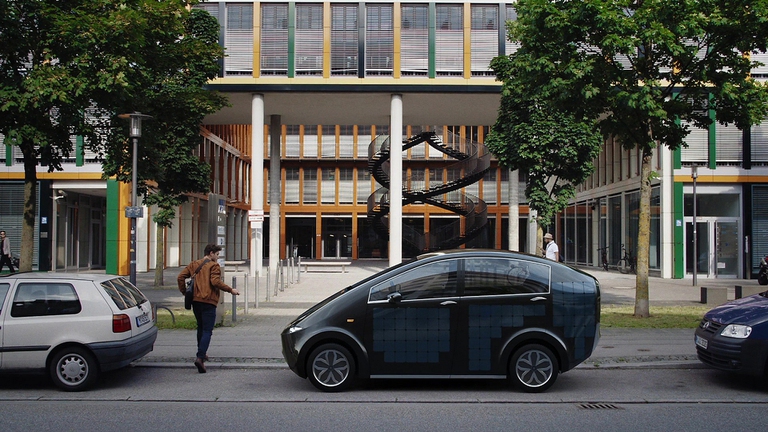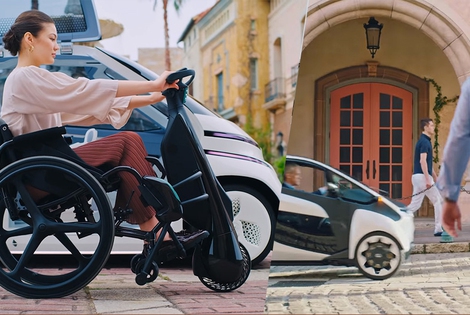
Milan has announced one of Europe’s most ambitious mobility schemes, known as Strade Aperte (open roads). Its goal is to reduce cars in phase 2 of the lockdown by increasing bike lanes and pedestrian areas.
It will be put on the market in 2018 and will be a six-passenger model. Designed in Germany and crowd-funded, it is world’s first solar car to be mass-produced. Prices start from 12,000 euros and the car travels 250 km on a full charge.
The electric car that is rechargeable thanks to solar energy is now a reality. Not a prototype, not a concept, not a show car displayed in an auto show, it is a functioning, concrete vehicle that can be ordered starting from next year. A step towards unconventional mobility. And most importantly a step that everyone can afford, since its price won’t exceed 12,000 euros.
The world’s first production car partially powered by solar panels was invented in Germany by three neo-graduates who launched the start-up Sono Motors. In a garage in Munich they spent four years designing and making the first prototype of an electric car powered by solar panels. The creation of this car recalls the invention of the first Apple computer by Steve Jobs and Steve Wozniak. Sion, this is what Sono Motors called their “creature”, is a five-seater and six-door saloon, 4.11 metres long and made with light and resistant materials including polycarbonate and thermoplastic polyurethane. These solutions have already been used in the automotive industry; consider the BMW Group that uses carbon fiber-reinforced plastic (CFRP) to build the cabin of the i3 electric model.
With a 30 kWh lithium battery and a battery life of 250 kilometres, Sion is equipped with 7.5 square metres of solar panels. 30 kilometres per day are possible with electricity generated by the sun. So, it is a “common” electric vehicle but it also uses solar energy. It represents a considerable step forward compared to what has been invented so far, since the roof of the plug-in hybrid saloon Toyota Prius Prime, sold in Japan, and the Volkswagen Tiguan GTE and Ford C-MAX Solar Energi prototypes were the only applications of the photovoltaic technology to the automotive field. Nobody so far has introduced a vehicle covered with solar panels on the market. In addition, Sion reaches a maximum speed of 140 km/h and also functions as an accumulator, in fact, once connected to a socket it generates more than 2,000 watts.
Sion is available in two versions: Urban, fitted with a 14.4 kWh battery that has a 120 kilometre range, which will cost 12,000 euros; Extender, characterised by battery cells with a capacity of 30 kWh, thanks to which it’s possible to travel 250 kilometres on a full charge, which will cost 16,000 euros. The first models will be crowd-funded, so everyone can contribute to funding them with five or more euros. It will be put on the market in 2018. Provided that you have a green thumb, Yes, because the air purification system will use a small lichen plantation inserted in the dashboard. The best of sustainability.
Siamo anche su WhatsApp. Segui il canale ufficiale LifeGate per restare aggiornata, aggiornato sulle ultime notizie e sulle nostre attività.
![]()
Quest'opera è distribuita con Licenza Creative Commons Attribuzione - Non commerciale - Non opere derivate 4.0 Internazionale.
Milan has announced one of Europe’s most ambitious mobility schemes, known as Strade Aperte (open roads). Its goal is to reduce cars in phase 2 of the lockdown by increasing bike lanes and pedestrian areas.
Formula 1, the world’s most important auto racing championship, has decided to turn the page and aim for carbon neutrality with the support of its teams, drivers and the whole racing circus.
Toyota and LifeGate began telling the story of hybrid mobility back in 2006, now, on the road to the Tokyo 2020 Olympics, they’re still treading the path of sustainable mobility. Here are the main steps of the journey.
Germany’s first solar bicycle lane could be the prototype for the roads of the future. The photovoltaic tiles melt snow and ice, and are capable of absorbing noise.
The Vespa is back in an electric version. Production has just started and the first models can be reserved online starting from October.
The city of Utrecht, in the Netherlands, is home to a bridge for cycling and walking that stretches over roof garden of a Montessori school. This project enhances practicality and will allow families to bring children to school by bike, passing through green areas. Despite their functionality, bridges are often seen as an infrastructure that is
The Lego hair bike helmet is the latest Internet craze. For now it’s just a prototype but production on a large scale will probably start soon.
Just as fires often give way to new growth, after the Dieselgate scandal, which saw Volkswagen cheating on US emission rules, the German car manufacturer radically changed course, beginning to focus on sustainable mobility. The German car company aims to propose thirty zero-emission models and produce at least one million battery electric vehicles by 2025. An ambitious mission
Sustainable, two-wheel mobility is triumphing in Copenhagen. After years of investments, policies, and infrastructural changes, bikes now outnumber cars in the city centre. The website Copenhagenize has released data linked to the number of vehicles entering the city centre, which are monitored by the city’s administration on a daily basis. Last year, 265,700 bikes have entered








